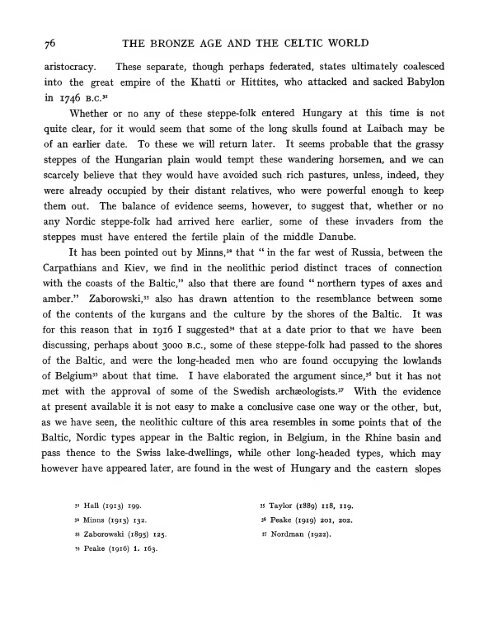The bronze age and the Celtic world - Universal History Library
The bronze age and the Celtic world - Universal History Library
The bronze age and the Celtic world - Universal History Library
You also want an ePaper? Increase the reach of your titles
YUMPU automatically turns print PDFs into web optimized ePapers that Google loves.
76 THE BRONZE AGE AND THE CELTIC WORLD<br />
aristocracy. <strong>The</strong>se separate, though perhaps federated, states ultimately coalesced<br />
into <strong>the</strong> great empire of <strong>the</strong> Khatti or Hittites, who attacked <strong>and</strong> sacked Babylon<br />
in 1746 B.C.3'<br />
Whe<strong>the</strong>r or no any of <strong>the</strong>se steppe-folk entered Hungary at this time is not<br />
quite clear, for it would seem that some of <strong>the</strong> long skulls found at Laibach may be<br />
of an earlier date. To <strong>the</strong>se we will return later. It seems probable that <strong>the</strong> grassy<br />
steppes of <strong>the</strong> Hungarian plain would tempt <strong>the</strong>se w<strong>and</strong>ering horsemen, <strong>and</strong> we can<br />
scarcely beheve that <strong>the</strong>y would have avoided such rich pastures, unless, indeed, <strong>the</strong>y<br />
were already occupied by <strong>the</strong>ir distant relatives, who were powerful enough to keep<br />
<strong>the</strong>m out. <strong>The</strong> balance of evidence seems, however, to suggest that, whe<strong>the</strong>r or no<br />
any Nordic steppe-folk had arrived here earlier, some of <strong>the</strong>se invaders from <strong>the</strong><br />
steppes must have entered <strong>the</strong> fertile plain of <strong>the</strong> middle Danube.<br />
It has been pointed out by Minns,^* that " in <strong>the</strong> far west of Russia, between <strong>the</strong><br />
Carpathians <strong>and</strong> Kiev, we find in <strong>the</strong> neolithic period distinct traces of connection<br />
with <strong>the</strong> coasts of <strong>the</strong> Baltic," also that <strong>the</strong>re are found " nor<strong>the</strong>rn types of axes <strong>and</strong><br />
amber." Zaborowski," also has drawn attention to <strong>the</strong> resemblance between some<br />
of <strong>the</strong> contents of <strong>the</strong> kurgans <strong>and</strong> <strong>the</strong> culture by <strong>the</strong> shores of <strong>the</strong> Baltic. It was<br />
for this reason that in igi6 I suggested^* that at a date prior to that we have been<br />
discussing, perhaps about 3000 B.C., some of <strong>the</strong>se steppe-folk had passed to <strong>the</strong> shores<br />
of <strong>the</strong> Baltic, <strong>and</strong> were <strong>the</strong> long-headed men who are found occupying <strong>the</strong> lowl<strong>and</strong>s<br />
of Belgium" about that time. I have elaborated <strong>the</strong> argument since,^^ but it has not<br />
met with <strong>the</strong> approval of some of <strong>the</strong> Swedish archaeologists.^' With <strong>the</strong> evidence<br />
at present available it is not easy to make a conclusive case one way or <strong>the</strong> o<strong>the</strong>r, but,<br />
as we have seen, <strong>the</strong> neolithic culture of this area resembles in some points that of <strong>the</strong><br />
Baltic, Nordic types appear in <strong>the</strong> Baltic region, in Belgium, in <strong>the</strong> Rhine basin <strong>and</strong><br />
pass <strong>the</strong>nce to <strong>the</strong> Swiss lake-dwellings, while o<strong>the</strong>r long-headed types, which may<br />
however have appeared later, are found in <strong>the</strong> west of Hungary <strong>and</strong> <strong>the</strong> eastern slopes<br />
3" Hall (1913) 199. 35 Taylor (i88g) ii8, 119.<br />
3» Minns (1913) 132. 3' Peake (1919) 201, 202.<br />
33 Zaborowski (1895) 125. 37 Nordman (1922).<br />
34 Peake (1916) 1. 163.







